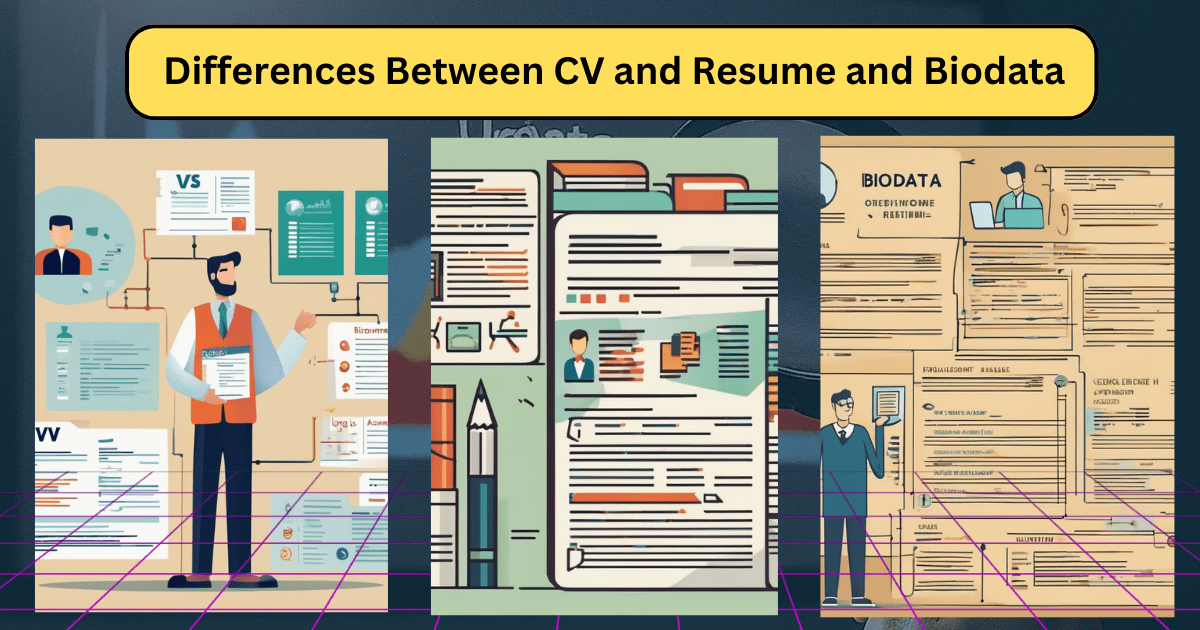Problem to pick between a CV and resume and biodata? Master the differences and learn when to use each to land your dream job.
In the competitive world of job applications, presenting yourself effectively is crucial. While a strong cover letter can introduce you, a well-crafted resume, curriculum vitae (CV), or biodata acts as your first impression on potential employers. Understanding the differences between CV, resume, and biodata is essential to ensure you submit the most appropriate document and increase your chances of landing that dream job.
What is a Resume?
A resume is a concise one- to two-page document that highlights your most relevant skills and experience tailored to a specific job application. It serves as a quick snapshot of your qualifications, achievements, and professional background, enticing the hiring manager to learn more about you.
Key elements of a strong resume:
- Contact Information: Ensure your name, phone number, email address, and any relevant professional social media profiles (e.g., LinkedIn) are clearly displayed.
- Professional Summary/Objective: Briefly introduce yourself and your career goals, emphasizing your value proposition and how you can contribute to the company.
- Work Experience: List your professional experience in reverse chronological order, starting with your current or most recent position. Include the company name, job title, dates of employment, and key responsibilities and achievements using strong action verbs and quantifiable results whenever possible.
- Education and Qualifications: List your educational background, including the institution name, degree obtained, and relevant coursework or certifications.
- Skills: Showcase your skills relevant to the applied position. This can include technical skills, soft skills, and any industry-specific expertise.
Delving Deeper: The Comprehensive Curriculum Vitae (CV)
A curriculum vitae (CV), also referred to as a “vitae”, is a more comprehensive document compared to a resume, typically ranging from two to four pages. It provides a detailed account of your academic qualifications, research experience, professional history, and achievements.
When to use a CV:
- Academic applications: Applying for postgraduate studies (Masters, Ph.D.) often requires a CV due to the emphasis on research experience and publications.
- Research positions: Research institutions and universities typically require a CV to assess a candidate’s in-depth research background and expertise.
- Extensive professional experience: Individuals with long and distinguished careers may utilize a CV to comprehensively document their accomplishments and contributions across various roles.
Content of a CV:
A CV generally incorporates similar sections as a resume (contact information, summary, work experience, education) but with a more elaborate presentation.
Additional sections commonly found in a CV include:
- Research publications and grants: List your research publications in peer-reviewed journals, conference proceedings, or any awarded research grants.
- Awards and honors: Mention any academic awards, scholarships, or professional recognitions you have received.
- Teaching experience: Include details about your teaching experience, if applicable, mentioning courses taught and any pedagogical achievements.
- Languages: Indicate your proficiency in various languages.
Biodata – A Regional Focus
The term biodata is primarily used in certain regions, particularly South Asia, and serves a limited purpose in the global job market.
Distinguishing features of a Biodata:
- Unlike resumes and CVs, biodata often includes personal information such as date of birth, marital status, religion, and even hobbies.
- Important Note: Including this type of personal information in applications is generally not recommended in most countries outside South Asia due to potential discrimination concerns.
- Biodata is primarily used for government job applications or in specific regional contexts where it might be required by the employer.
Key Differences Between CV and Resume and Biodata (Table Summarization)
| Feature | Resume | Curriculum Vitae (CV) | Biodata |
| Length | 1-2 pages | 2-4+ pages | Varies |
| Content Focus | Skills & relevant experience | Detailed academic & professional background | Primarily personal information with some professional details |
| Purpose | Job applications (general) | Academic applications, research positions, extensive experience | Primarily used in specific regions for government jobs or as per employer requirements |
Choosing the Right Document: A Guide
Selecting the appropriate document between a resume, CV, and biodata depends on the specific situation:
When to use a Resume:
- Resumes are the most widely used document for job applications across various industries and sectors.
- Tailor your resume to highlight the skills and experiences most relevant to the specific job description you are applying for.
Case Studies: Choosing the Right Document in Action
Here are some real-world scenarios to illustrate the appropriate document selection:
- Applying for a marketing manager position in a tech company: In this case, a well-crafted resume tailored to highlight your marketing skills, experience with relevant software, and achievements in past campaigns would be the most suitable choice.
- Applying for a Ph.D. program in astrophysics: Given the emphasis on academic qualifications and research experience, a comprehensive CV would be the preferred document. You can showcase your research publications, awards, and relevant coursework within the CV.
- Applying for a government job in a South Asian country: While some government institutions might accept resumes, specific regional requirements might necessitate a biodata. Ensure you follow the application guidelines strictly and only include information explicitly requested.
Conclusion
Understanding the difference between CV and resume, and biodata empowers you to select the most fitting document for each application scenario. Remember, a well-crafted and targeted document acts as your gateway to securing that coveted interview. By effectively showcasing your qualifications and achievements, you can increase your chances of landing your dream job.
Also Read:- Google Core Update 2024: बेहतर रैंकिंग के लिए अपनी वेबसाइट को तैयार करें
